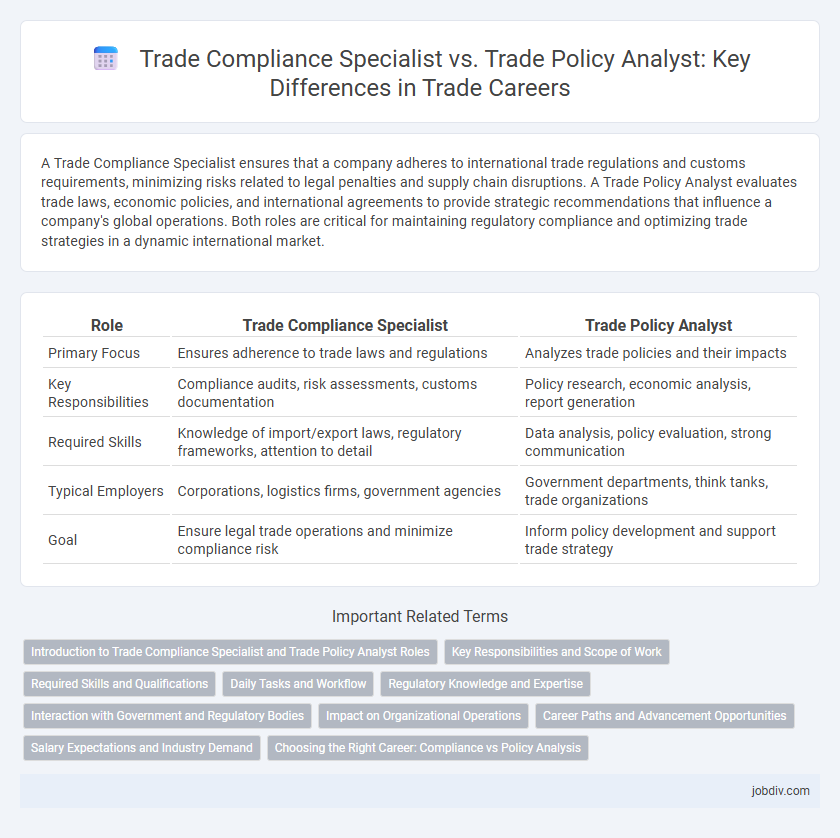A Trade Compliance Specialist ensures that a company adheres to international trade regulations and customs requirements, minimizing risks related to legal penalties and supply chain disruptions. A Trade Policy Analyst evaluates trade laws, economic policies, and international agreements to provide strategic recommendations that influence a company's global operations. Both roles are critical for maintaining regulatory compliance and optimizing trade strategies in a dynamic international market.
Table of Comparison
| Role | Trade Compliance Specialist | Trade Policy Analyst |
|---|---|---|
| Primary Focus | Ensures adherence to trade laws and regulations | Analyzes trade policies and their impacts |
| Key Responsibilities | Compliance audits, risk assessments, customs documentation | Policy research, economic analysis, report generation |
| Required Skills | Knowledge of import/export laws, regulatory frameworks, attention to detail | Data analysis, policy evaluation, strong communication |
| Typical Employers | Corporations, logistics firms, government agencies | Government departments, think tanks, trade organizations |
| Goal | Ensure legal trade operations and minimize compliance risk | Inform policy development and support trade strategy |
Introduction to Trade Compliance Specialist and Trade Policy Analyst Roles
Trade Compliance Specialists ensure companies adhere to international trade laws, managing import/export regulations, customs documentation, and risk assessments to prevent violations. Trade Policy Analysts evaluate global trade agreements, monitor regulatory changes, and assess economic impacts to inform corporate or governmental trade strategies. Both roles require expertise in trade regulations but focus respectively on operational compliance and policy analysis.
Key Responsibilities and Scope of Work
Trade Compliance Specialists ensure adherence to international trade laws by managing import/export documentation, conducting audits, and implementing internal controls to mitigate risks of non-compliance. Trade Policy Analysts research and evaluate trade regulations, tariffs, and bilateral agreements to advise on policy development and strategic trade initiatives. The Specialist focuses on operational enforcement and risk management, while the Analyst emphasizes regulatory interpretation and policy formulation.
Required Skills and Qualifications
Trade Compliance Specialists require in-depth knowledge of customs regulations, export controls, and risk management, along with certifications such as CTPAT or Certified Export Specialist. Trade Policy Analysts need strong analytical skills, expertise in trade laws, economic analysis, and policy development, often supported by degrees in international trade or economics. Both roles demand excellent communication skills, attention to detail, and proficiency in regulatory frameworks relevant to global commerce.
Daily Tasks and Workflow
Trade Compliance Specialists ensure that all import and export activities adhere to international trade regulations by conducting risk assessments, preparing documentation, and coordinating with customs authorities. Trade Policy Analysts focus on researching and analyzing trade policies, monitoring regulatory changes, and providing strategic recommendations to influence or adjust company practices. The specialist's daily workflow involves hands-on compliance verification and interaction with regulatory bodies, while the analyst emphasizes data analysis, policy interpretation, and reporting to support organizational trade decisions.
Regulatory Knowledge and Expertise
Trade Compliance Specialists possess in-depth regulatory knowledge, ensuring companies adhere to international trade laws, export controls, and customs regulations to avoid penalties and optimize supply chain efficiency. Trade Policy Analysts focus on analyzing and interpreting trade agreements, tariffs, and government policies, providing insights that shape strategic decision-making and influence policy development. Both roles require expertise in global trade frameworks, but Compliance Specialists emphasize operational adherence while Policy Analysts concentrate on regulatory trends and policy impact.
Interaction with Government and Regulatory Bodies
Trade Compliance Specialists ensure adherence to import-export regulations by directly interacting with customs authorities, regulatory agencies, and international trade bodies to prevent violations and facilitate smooth cross-border transactions. Trade Policy Analysts engage with government policymakers, trade commissions, and international organizations to analyze and influence trade regulations, shaping policy decisions based on economic and political factors. Both roles require a deep understanding of regulatory frameworks, but Trade Compliance Specialists focus more on operational enforcement, while Trade Policy Analysts emphasize strategic policy development.
Impact on Organizational Operations
A Trade Compliance Specialist ensures adherence to international trade laws and regulations, minimizing legal risks and preventing costly sanctions that can disrupt organizational operations. In comparison, a Trade Policy Analyst evaluates trade policies and their implications, providing strategic insights that influence company decisions and competitive positioning in global markets. Both roles are critical, with compliance safeguarding operational continuity and policy analysis driving informed business strategy.
Career Paths and Advancement Opportunities
Trade Compliance Specialists focus on ensuring companies adhere to international trade laws and regulations, often advancing to roles such as compliance managers or customs experts. Trade Policy Analysts concentrate on interpreting and developing trade policies, advancing toward senior analyst positions or advisory roles in government and think tanks. Both career paths offer progression opportunities, but compliance specialists typically advance within corporate and operational frameworks, while policy analysts move within strategic and legislative environments.
Salary Expectations and Industry Demand
Trade Compliance Specialists typically earn between $60,000 and $90,000 annually, reflecting strong demand in industries such as manufacturing, logistics, and import-export firms. Trade Policy Analysts command salaries ranging from $70,000 to $110,000, driven by high demand in government agencies, think tanks, and international organizations focused on regulatory frameworks and economic policy. Both roles require distinct expertise, with Trade Policy Analysts often receiving higher compensation due to specialized skills in economic analysis and policy development.
Choosing the Right Career: Compliance vs Policy Analysis
Trade Compliance Specialists ensure companies adhere to international trade laws and regulations, minimizing legal risks and penalties, while Trade Policy Analysts evaluate and influence trade policies to support economic objectives and market access. Career choices depend on preference for detailed regulatory enforcement versus strategic policy development, with compliance roles demanding precise legal knowledge and analysts requiring strong research and communication skills. Understanding the operational impact and skill alignment in compliance versus policy analysis guides professionals toward a fulfilling trade career.
Trade Compliance Specialist vs Trade Policy Analyst Infographic

 jobdiv.com
jobdiv.com